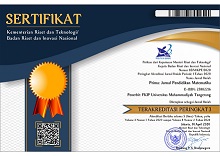ANALYSIS OF STUDENT’S CRITICAL THINKING ABILITY IN SOLVING SOCIAL ARITHMETIC PROBLEMS IN VIEW OF GENDER
Abstract
This study aims to develop students' ability to use critical thinking to solve social arithmetic problems. This study adopted qualitative and descriptive methods. The subjects of this study included 3 male students and 3 female students from VII E of SMP Negeri 1 Masaran. The data collection techniques used in this study are tests, interviews and documents. Data validity is based on a triangulation process. Analytical techniques reduce data, display it, and draw conclusions. The results revealed differences in critical thinking skills when solving social computing tasks associated with gender differences. In terms of high critical thinking skills, both male and female students mastered all the indicators of critical thinking, namely interpretation, analysis, evaluation and reasoning. In terms of critical thinking ability, boys in the middle category can master three indicators, namely interpretation, evaluation and conclusion. Female students, on the other hand, can only understand explanatory, analytical and evaluative indicators. In the low category, critical thinking ability has only two indicators of critical thinking, interpretation and analysis.
Keywords: critical thinking, gender, social arithmetic
Full Text:
PDFReferences
Cahyono, B. (2017). Analyze critical thinking skills for problem-solving from a gender-difference perspective. Axioms, 8(1), 50. https://doi.org/10.26877/aks.v8i1.1510
Davita, P. W. C., & Pujiastuti, H. (2020). Analysis of mathematics problem-solving ability from gender perspective. Kreano, Journal of Creative Mathematics, 11(1), 110-117. https://doi.org/10.15294/kreano.v11i1.23601
Ennis, R. H. (1996). Critical thinking dispositions: their nature and evaluability. Informal Logic, 18(2), 165–182. https://doi.org/10.22329/il.v18i2.2378
Irfan, M., Sa'dijah, C., Ishartono, N., Widodo, S., Rahman, A., and Hudha, M. (2019, April 15). Solve the distractions of math problems. https://doi.org/10.4108/eai.19-10-2018.2281319
Ishartono, N., Setyono, I. D., Maharani, A. R., & Firdaus, S. (2022). The Quality of Mathematics Teaching Aids Developed by Mathematics Pre-Service Teachers in Indonesia. Jurnal Varidika, 34(1), 14–27. https://doi.org/10.23917/varidika.v1i1.18034
KEMENDIKBUD . 2016. Peringkat dan Capaian PISA Indonesia Mengalami Peringkatan
Khoiril Anwar and Sutama (2019). Ability and Error Analysis of Solving PISA Mathematics Story-Oriented Questions from the Gender Perspective of SMP Muhammadiyah 2 Surakarta Class VII Students.
Kurniawan, H. S., & Khotimah, R. P. (2022). PROFIL KEMAMPUAN LITERASI MATEMATIS SISWA DALAM MENYELESAIKAN SOAL HIGH ORDER THINKING SKILL. AKSIOMA: Jurnal Program Studi Pendidikan Matematika, 11(3), 1966. https://doi.org/10.24127/ajpm.v11i3.5563
Mahmud, M., & Nur, S. (2018). Exploring students’ learning strategies and gender differences in english language teaching. International Journal of Language Education, 2(1), 51–64. https://doi.org/10.26858/ijole.v2i1.4346
Mufidah, S. (2017). Develop realistic mathematics learning tools on social arithmetic textbooks to improve the higher-level thinking ability of students in the seventh class.
Murtiyasa, B., & Perwita, W. R. G. (2020). Analysis of mathematics literation ability of students in completing PISA-oriented mathematics problems with changes and relationships content. Universal Journal of Educational Research, 8(7), 3160–3172. https://doi.org/10.13189/ujer.2020 .080745
Nastiti, A.M., Nindiasari, H., and Novaliyosi. (2020). Analysis of mathematical critical thinking ability of middle school students in online learning. WILANGAN: Journal of Innovation and Research in Mathematics Education, 1(4), 341–352.
Paramitha, N., & Yunianta, T. N. (2017). Analysis of creative thinking process in solving math problems in social arithmetic textbooks for high-ability junior high school students. Journal of Educational Partners (JMP Online), 1(10), 983–994.
Putri Apriliana, L., Handayani, I., & Ajiz Awalludin, S. (2019). The Effect of a Problem Centered Learning on Student’s Mathematical Critical Thinking. In Journal of Research and Advances in Mathematics Education (Vol. 4, Issue 2). http://journals.ums.ac.id/index.php/jramathedu
Ramdiah, S., & Duran Corebima, A. (2014). Learning Strategy Equalizing Students’ Achievement, Metacognitive, and Critical Thinking Skills. American Journal of Educational Research, 2(8), 577–584. https://doi.org/10.12691/education-2-8-3
Riyanto, A., & Ishartono, N. (2022). Kemampuan Berpikir Kritis Siswa dalam Menyelesaikan Artimatika Sosial Ditinjau dari Kemampuan Matematis dan Gender. Jurnal Cendekia : Jurnal Pendidikan Matematika, 6(3), 2552–2568. https://doi.org/10.31004/cendekia.v6i3.1435
Saputri, A. I., & Khotimah, R. P. (2020). Analisis Literasi Matematika Berorientasi PISA Konten Space and Shape.
Susilo, B. E., Darhim, D., & Prabawanto, S. (2019). Students critical thinking skills toward concepts differences in finding area of a plane region and definite integral. Unnes Journal of Mathematics Education, 8(1), 1–7. https://doi.org/10.15294/ujme.v8i1.29463
Uscianowski, C., Almeda, M.V., and Ginsburg, H.P. (2020). Differences in complexity of math and literacy problems asked by parents when reading picture books. Early Childhood Research Quarterly, 50, 40-50. https://doi.org/10.1016/j.ecresq.2018.07.003
Widada, W., Herawaty, D. and Lubis, A.N.M.T. (2018). Realistic mathematics learning based on Bengkulu National Mathematics to improve students' cognitive level. Journal of Physics: Conference Series, 1088. https://doi.org/10.1088/1742-6596/1088/1/012028
Widakdo, W. A. (2017). Learn mathematical representation skills through project-based statistics. Journal of Physics: Conference Series, 895(1). https://doi.org/10.1088/1742-6596/895/1/012055
DOI: http://dx.doi.org/10.31000/prima.v7i2.8384
Article Metrics
Abstract - 1601 PDF - 826Refbacks
- There are currently no refbacks.
Prima: Jurnal Pendidikan Matematika
Program Studi Pendidikan Matematika
Fakultas Keguruan dan Ilmu Pendidikan
Universitas Muhammadiyah Tangerang
Jl. Perintis Kemerdekaan I/33, Cikokol
Kota Tangerang, Indonesia
e-mail: primajpm@gmail.com
Prima: Jurnal Pendidikan Matematika (p-ISSN: 2579-9827 | e-ISSN: 2580-2216) is licensed under a Creative Commons Attribution 4.0 International License.







